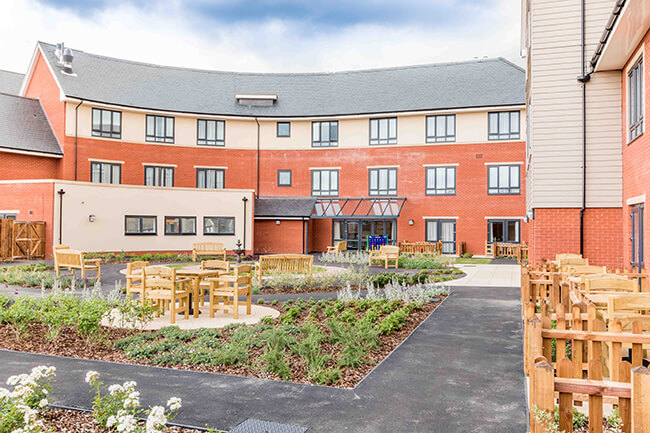At last dementia is getting the attention it requires
Home news
Mar 05, 2015
In her first article, Pauline Houchin, Care UK’s new head of care & clinical services, welcomes the increase in interest and funding that dementia care and research is receiving.
“Like Harry Potter’s nemesis Lord Voldemort, the word cancer was one that people could not utter even as recently as 20 years ago. It filled people with dread, as a diagnosis of the disease was too often a death sentence. As medical research and a universal will to beat the disease has grown, so too have survival rates and people’s willingness to discuss their experience of the condition.
I believe that dementia is on a similar journey. Sadly, we are still, to some degree, in the darker days where people are still uncomfortable talking about the issues dementia raises for their loved ones. The condition still, unjustly, carries a stigma and it is often one that those living with dementia, as well as those supporting them, share.
The King’s Fund believes that the financial cost of dementia in England will soar to £34.8 billion in 2026 - a rise of 135 per cent from £14.8 billion in 2007. Further research by the Alzheimer’s Society forecasts that more than a million people in the UK will have some form of dementia by 2025. Staggeringly, they predict that will rise to more than two million by 2051. So we not only need to work together to find a cure but we need to improve the lives of those who have, and will continue to develop, the condition until a cure is found.
The work done in care homes and support groups across the country, together with creative input such as Julianne Moore’s groundbreaking portrayal of an academic with early on-set dementia, is slowly turning the tide of fear and stigma and I hope, with the money pledged by the government and the intellectual contribution of conferences such as last week’s King Fund event, we will continue to move in the same direction as those challenging cancer.
More than £300 million is to be spent by the Government on research into dementia while around 13m NHS staff will have to undergo training in the condition, Prime Minister David Cameron has announced.
At Care UK we began a similar process in our care homes and last year our dementia trainers helped their colleagues at the Southampton NHS Treatment Centre not only to understand better how the condition affects people’s perceptions but also to create an environment within the centre that was less stressful to people living with the condition.
With the Prime Minister's challenge on dementia due to finish in May 2015, this is just the right time for everyone involved in dementia care and research to think about what we have achieved and what we need to achieve; now, a new national drive to sustain progress is essential.
The Prime Minister has described it as "one of the greatest challenges of our lifetime". He has given a commitment that an international dementia institute will be established in England and a separate multimillion-pound fund will be launched within weeks to help establish a large-scale, international investment scheme to discover new drugs and treatment that could slow down the onset of dementia or even deliver a cure by 2025.
I was also delighted to hear the Prime Minister pledge that more than half a million carers for people with dementia will be offered respite and emotional support. In Care UK’s care homes and day centres across the country we strive to offer this support both day and night. We are increasingly opening up our homes’ facilities to support carers in the community and, in Somerset, we have supported a mental health charity to run dementia workshops that provide companionship and stimulation to those living with dementia as well as respite to those who care for them.
There can never be too much support for those who care for loved ones and I look forward to seeing how this very worthwhile challenge is taken up at a local level as councils take on this new responsibility.
I was heartened to hear the positive views from professionals in health, social care, housing and the community reported from the King’s Fund’s conference ‘Leading Change in Dementia Diagnosis and Support’. I was also delighted to see that the CQC’s announcement of its five key principles for dementia care tally with the work we are doing as we move towards announcing our new dementia strategy.
The first of the inspectorate’s principles is helping people to maintain independence as long as possible and, in our day centres and through our care at home services, we are already working to preserve people’s life skills and independence. Through our full activities programmes we are also aiming to fulfil their second goal of helping people to live fulfilled lives. Across the country, residents of our homes are engaged in choirs, birdwatching activities, gardening and many, many more activities, as well as taking an active role on residents’ committees that help shape the feel and future of their home.
The third is to support families, which we do in every home on a daily basis, as well as through support groups, awareness seminars and through dementia guides such as ‘Listen, Talk, Connect’. They also highlight the importance of suitable end of life care and we have already taken this on board, with many homes working towards the Gold Standard Framework Care Homes Accreditation while others have worked with hospices to ensure that residents have genuine choice.
The CQC’s final principle is to see the person and not the condition, and that ties in with several uplifting talks on the use of life stories to create care and activity plans. Only by knowing the person can you truly support and care for them. Recently, I have been carrying out training sessions for colleagues using a memory box for a fictional lady called Mabel. I have been moved by the care, interest and insights people had as they examined Mabel’s box and then set about creating a seven-day activities programme based on her interests.
I think everyone involved in shaping dementia strategies and policies has a long way to go before we can truly say we have faced the stigma and fear and taken the fight to the dementia, in the same way that we have with cancer. But it is a journey that somehow seems more achievable as we square up to the challenges together.


